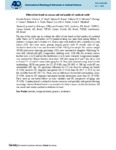Use este identificador para citar ou linkar para este item:
http://www.alice.cnptia.embrapa.br/alice/handle/doc/1055839Registro completo de metadados
| Campo DC | Valor | Idioma |
|---|---|---|
| dc.contributor.author | FAVERO, R. | pt_BR |
| dc.contributor.author | FEIJO, G. L. D. | pt_BR |
| dc.contributor.author | BONIN, M. N. | pt_BR |
| dc.contributor.author | MENEZES, G. R. de O. | pt_BR |
| dc.contributor.author | GOMES, R. da C. | pt_BR |
| dc.contributor.author | TORRES JUNIOR, R. A. de A. | pt_BR |
| dc.contributor.author | SURITA, LUCY M. A. | pt_BR |
| dc.contributor.author | MIZUBUTI, IVONE Y. | pt_BR |
| dc.date.accessioned | 2016-11-03T11:11:11Z | pt_BR |
| dc.date.available | 2016-11-03T11:11:11Z | pt_BR |
| dc.date.created | 2016-11-03 | pt_BR |
| dc.date.issued | 2016 | pt_BR |
| dc.identifier.citation | In: International Meeting of Advances in Animal Science, 2016., Jaboticabal. Anais... Jaboticabal: UNESP, 2016. | pt_BR |
| dc.identifier.uri | http://www.alice.cnptia.embrapa.br/alice/handle/doc/1055839 | pt_BR |
| dc.description | The aim of this study was to evaluate the effect of sire breed on beef quality of crossbred cattle. Steers (n=74) and heifers (n=71) produced along two years from mating Nellore, ½ Nellore x ½ Angus and ½ Nellore x ½ Caracu dams with Braford (BF), Charbray (CC) and Caracu (CR) sires were raised grazing tropical grasses until 20 months (mo) of age, finished in feedlot for 4 mo and harvested at 546 ± 60 kg live weight. Hot carcass weight (HCW) and c rcass dressing percentage (CD) were measured at slaughter. Following 24- hour chill, ultimate pH (pH), Longissimus marbling score (12th-13th ribs section), carcass backfat score (1 to 5) and backfat distribution (1 to 3) were evaluated. Longissimus samples were analyzed for Warner Bratzler shear force (SF) after aging for 0 and 7 day (d) as well as Hunter L*, a* and b* values after aging for 7d. Data were analyzed using mixed model methodology. HCW was greater for CC (P<0.05) than CR (305 vs. 288 kg) while BF was intermediate (301 kg). No significant difference for CD was observed among sire breeds (P>0.05), however CC progenies had greater CD (P<0.10) than CR (53.7 vs. 52.5 %), but did not differ from BF (53.2 %). There were no differences for backfat and marbling scores (P>0.05), however BF progenies had greater backfat distribution score than CC (P<0.05 ). There were no sire breed effects on color variables and SF, irrespective of aging time (P>0.05). Charbray breed is related to heavier carcasses and possibly with greater dressing percentage whereas Braford breed is associated with better carcass backfat distribution. All sire breeds had similar qualitative attributes of meat. | pt_BR |
| dc.language.iso | eng | eng |
| dc.rights | openAccess | eng |
| dc.title | Effect of sire breed on carcass and beef quality of crossbred cattle. | pt_BR |
| dc.type | Resumo em anais e proceedings | pt_BR |
| dc.date.updated | 2017-03-27T11:11:11Z | pt_BR |
| dc.subject.thesagro | Animal | pt_BR |
| dc.subject.nalthesaurus | Genetics | pt_BR |
| dc.subject.nalthesaurus | Breeding | pt_BR |
| dc.subject.nalthesaurus | Backfat | pt_BR |
| riaa.ainfo.id | 1055839 | pt_BR |
| riaa.ainfo.lastupdate | 2017-03-27 | pt_BR |
| dc.contributor.institution | RICARDO FAVERO, UEL; GELSON LUIS DIAS FEIJO, CNPGC; MARINA N. BONIN, UFMS; GILBERTO ROMEIRO DE OLIVEIRA MENEZE, CNPGC; RODRIGO DA COSTA GOMES, CNPGC; ROBERTO AUGUSTO DE A TORRES JUNIOR, CNPGC; LUCY M. A. SURITA, UCDB; IVONE Y. MIZUBUTI, UEL. | pt_BR |
| Aparece nas coleções: | Resumo em anais de congresso (CNPGC)  | |
Arquivos associados a este item:
| Arquivo | Descrição | Tamanho | Formato | |
|---|---|---|---|---|
| Faveroetal2016sirebreedcarcassbeefquality.pdf | 109,79 kB | Adobe PDF |  Visualizar/Abrir |









